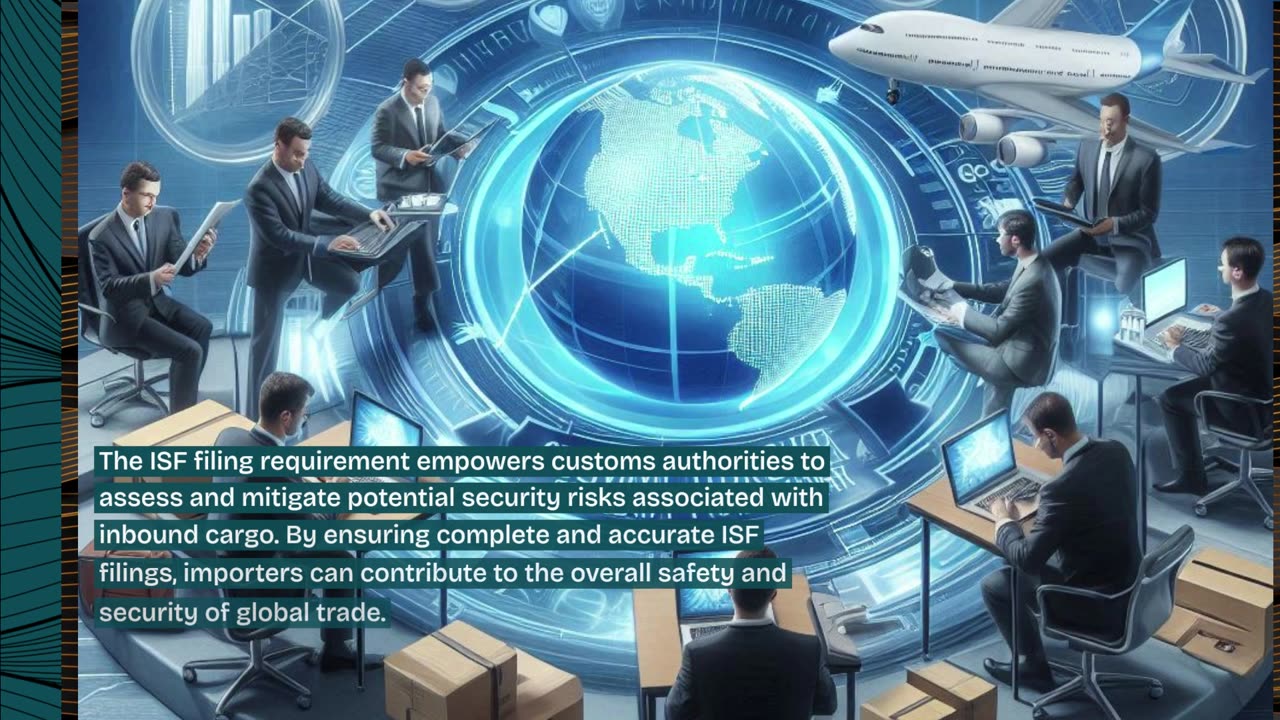Premium Only Content

Mastering Trade Compliance: The Path to Excellence in Customs Brokerage
ISF Filer || isf@isffiler.com || 858-280-9374 || www.isffiler.com
In today's episode of ISF Filer, we discussed the road to trade compliance excellence for customs brokers. Customs brokers play a crucial role as intermediaries between importers and government agencies, ensuring compliance with customs procedures, tariffs, and trade regulations.
One important requirement for importers is obtaining a customs bond, which serves as a financial guarantee to the government. By obtaining a customs bond, importers demonstrate their commitment to complying with customs regulations, ensuring that all duties, taxes, and fees will be paid.
Another key aspect of trade compliance is the Importer Security Filing (ISF), which must be submitted at least 24 hours before cargo is loaded onto a vessel bound for the United States. ISF filings provide detailed information about the shipment and enable customs authorities to assess and mitigate potential security risks.
To achieve trade compliance excellence, customs brokers need to build a robust compliance program within their organizations. This involves establishing standard operating procedures, conducting regular audits, and educating employees about the importance of following customs regulations.
Leveraging technology is also crucial in enhancing trade compliance efforts. Investing in comprehensive customs brokerage software can streamline processes, automate repetitive tasks, and provide real-time visibility into the status of shipments.
Staying updated with trade regulations and industry best practices is essential for customs brokers and importers. Attending trade conferences, participating in webinars, and engaging in continuous learning help to stay ahead of the curve and maintain a competitive edge.
Collaborating with trusted partners and industry associations is another strategy to achieve trade compliance excellence. Organizations such as the NCBFAA and IFCBA provide access to valuable resources, networking opportunities, and the latest industry insights.
In summary, the road to trade compliance excellence for customs brokers involves understanding their role, obtaining a customs bond, and submitting accurate ISF filings. Building a robust compliance program, leveraging technology, staying updated, and collaborating with trusted partners are critical steps in achieving trade compliance excellence. Stay tuned for more episodes of ISF Filer, your go-to resource for all things related to customs brokerage and trade compliance.
#usimportbond #isfcustomsbroker #uscustomsclearing #isfentry
Video Disclaimer Here: This video is intended for educational purposes and has no affiliation with US government entities.
00:34 - Understand the Role: Customs brokers play a crucial role as intermediaries between importers and government agencies, ensuring compliance with customs regulations, tariffs, and procedures across different countries.
01:19 - Compliance Requirements: Importers must obtain a Customs Bond as a financial guarantee to the government for duties and fees payment. Importer Security Filings (ISF) must be submitted at least 24 hours before cargo loading to the US, providing detailed shipment information to enhance security.
01:49 - Road to Excellence: Develop a compliance program with SOPs, audits, and employee training to foster a culture of compliance, reduce risks, and ensure smooth operations. Utilize technology like customs brokerage software for efficient processes and real-time shipment tracking.
-
 12:19
12:19
Tundra Tactical
11 hours ago $10.78 earnedDaniel Penny Beats Charges in NYC Subway Killing
44.4K10 -
 29:53
29:53
MYLUNCHBREAK CHANNEL PAGE
1 day agoUnder The Necropolis - Pt 1
127K45 -
 2:00:10
2:00:10
Bare Knuckle Fighting Championship
3 days agoCountdown to BKFC on DAZN HOLLYWOOD & FREE LIVE FIGHTS!
49.5K3 -
 2:53:01
2:53:01
Jewels Jones Live ®
1 day agoA MAGA-NIFICENT YEAR | A Political Rendezvous - Ep. 103
129K32 -
 29:54
29:54
Michael Franzese
14 hours agoCan Trump accomplish everything he promised? Piers Morgan Article Breakdown
122K51 -
 2:08:19
2:08:19
Tactical Advisor
18 hours agoThe Vault Room Podcast 006 | Farwell 2024 New Plans for 2025
190K11 -
 34:12
34:12
inspirePlay
1 day ago $5.73 earned🏆 The Grid Championship 2024 – Cass Meyer vs. Kelly Rudney | Epic Battle for Long Drive Glory!
89.9K8 -
 17:50
17:50
BlackDiamondGunsandGear
16 hours ago $3.11 earnedTeach Me How to Build an AR-15
63.9K6 -
 9:11
9:11
Space Ice
1 day agoFatman - Greatest Santa Claus Fighting Hitmen Movie Of Mel Gibson's Career - Best Movie Ever
121K48 -
 42:38
42:38
Brewzle
1 day agoI Spent Too Much Money Bourbon Hunting In Kentucky
82.2K13